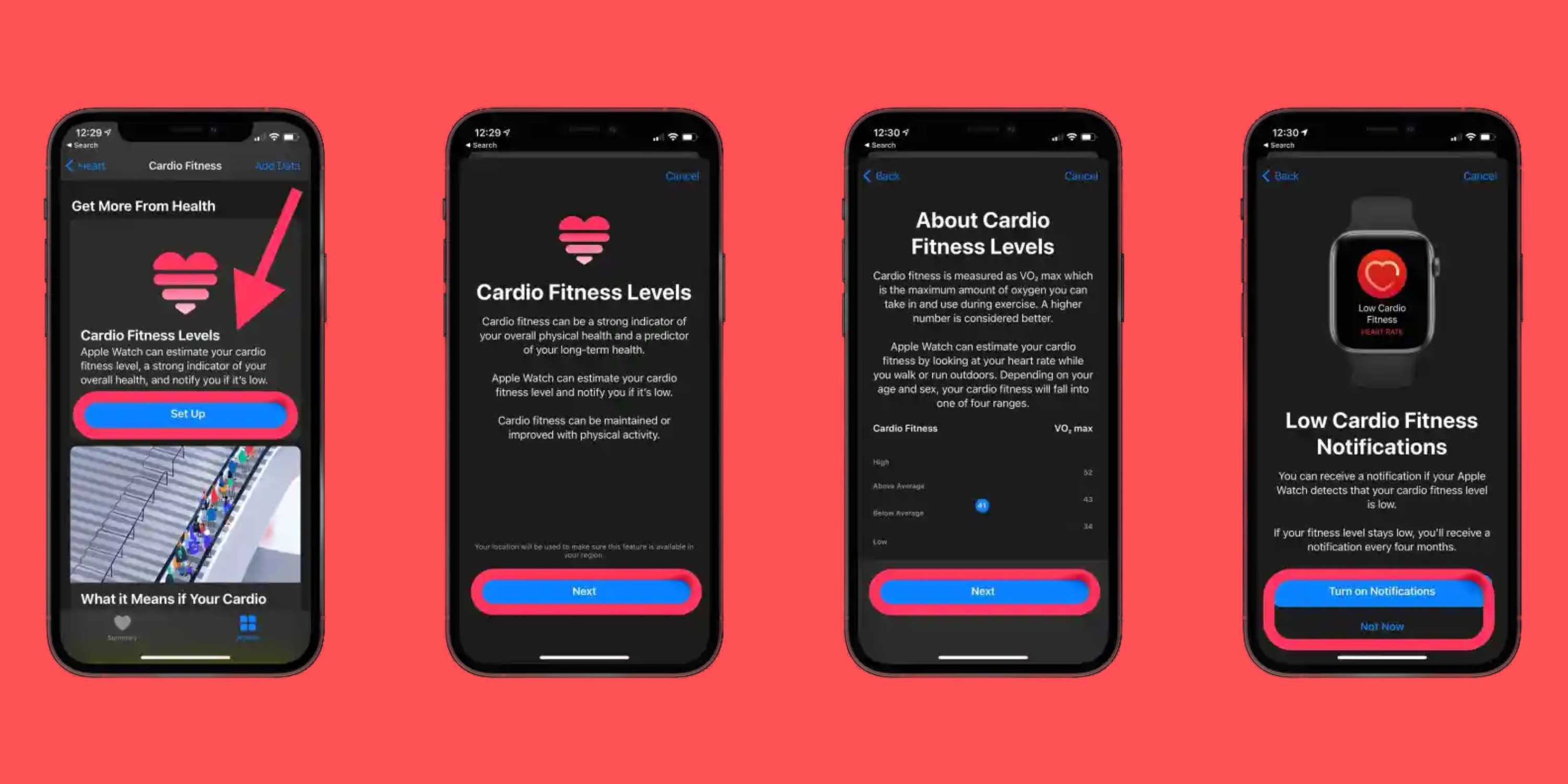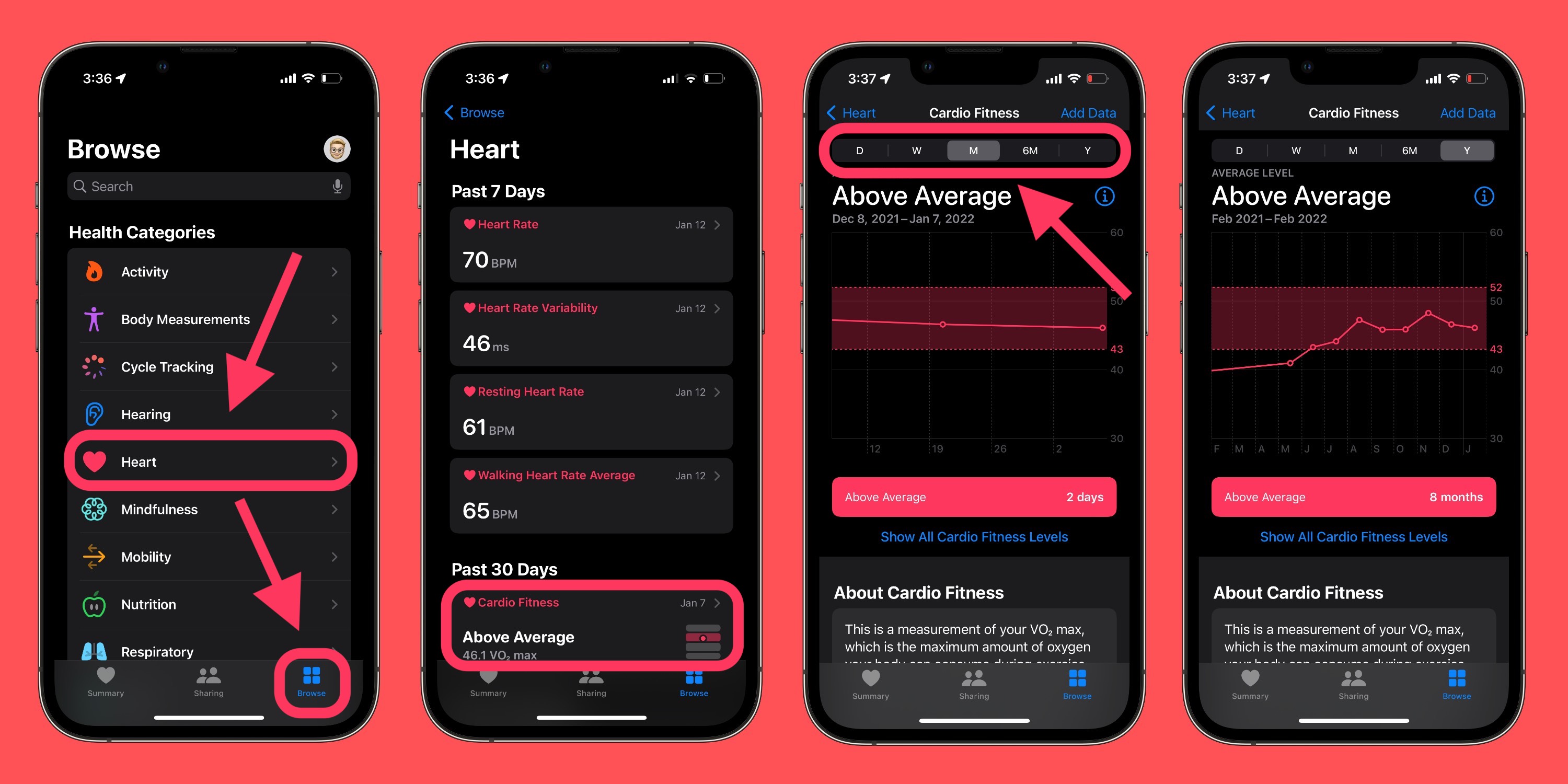
One of the useful and somewhat buried health features on Apple Watch is VO2 max. The measurement can be estimated by Apple Watch when recording specific workouts but it isn’t enabled by default and actually goes by another name. Follow along for a look at how to use VO2 max with Apple Watch and iPhone including why it’s important, how to set it up, and how to view your VO2 max levels.
Table of contents
VO2 max background
Whether you’re new to Apple Watch or have had one for a while and haven’t tracked VO2 max before, it’s a valuable measurement to understand and use.
But since VO2 max tracking isn’t turned on by default and Apple uses the name “Cardio Fitness,” it flies under the radar for many. Here’s how the company describes it:
Apple Watch users can view their cardio fitness level in the Health app on iPhone, and receive a notification on Apple Watch if it falls within the low range. Breakthrough technology released in watchOS 7 allows Apple Watch to easily measure low cardio fitness, and today cardio fitness notifications empower users to be more active for dramatic long-term health benefits.
Cardiorespiratory fitness, as measured by VO2 max, is the maximum amount of oxygen the body can use during exercise, and it can be increased through physical activity. Apple Watch already estimates average and higher levels of VO2 max during vigorous outdoor walks, runs, or hikes, which many runners and other athletes monitor to improve performance.
By measuring the “body’s ability to take in, circulate, and use oxygen” Cardio Fitness via VO2 max is a metric that gives a good indication of overall health and can also predict long-term health. While there’s a correlation between low VO2 max and future health issues, you can raise your levels with consistent aerobic exercise ?.
Relative VO2 max is expressed as a number between 14 and 60 with Apple Watch/iPhone and represents the amount of milliliters of oxygen used in one minute per kilogram of body weight (mL/kg/min).
Two more great resources to track heart health is with HRV on Apple Watch and the Withings “Vascular Age” feature on its latest Body Cardio smart scale.
- What is HRV and how can you track/use it with Apple Watch and iPhone?
- Review: Withings Body Cardio smart scale with Apple Health now features Vascular Age
How to use VO2 max with Apple Watch and iPhone
- If you haven’t set up VO2 max up before, open the Health app on your iPhone
- Tap Summary and swipe down near the bottom and look for Cardio Fitness Levels (under “Get More From Health”)
- Choose the blue Set Up button
- Follow the prompts like confirming your health details (users must be at least 20 years old)
- You can choose to turn Low Cardio Fitness Notifications on for your Apple Watch
- Now you’ll see VO2 max/Cardio Fitness show up under the Heart section in the Health app

- You won’t see VO2 max/Cardio Fitness Levels for every workout recorded with Apple Watch, here’s what Apple says:
- Apple Watch can record an estimated VO2 between 14 and 60 mL/kg/min when you do a brisk hike, walk, or run outdoors with persistent heart rate measurement. It can estimate your VO2 max if you start one of those workouts in the Workouts app
- VO2 max is validated for users 20 and older. Most people can improve their VO2 max with more intense and more frequent cardiovascular exercise. Certain conditions or medications that limit your heart rate may cause an overestimation of your VO2 max. You can indicate you’re taking certain medications in the Health Details.
- You can read more specifics about Cardio Fitness in the Cardio Fitness section in the Health app.
Interestingly, Cardio Fitness Levels will show up even for outdoor walk/hike/run workouts that you’ve previously done. You can tap the timeframe icons at the top of Cardio Fitness to see daily, weekly, monthly, and yearly data (see more on this below).
Apple notes that cycling is another great aerobic exercise to improve Cardio Fitness, but for now, it doesn’t look like tracking Cycling workouts on Apple Watch will record VO2 max.
- You can look at your VO2 max/Cardio Fitness levels any time by heading to the Health app
- Tap Browse > Heart > Cardio Fitness
- Tap the blue “Show All Cardio Fitness Levels” to see all your available data
- Now you can see the months you’ve been in the low, below average, above average, and high categories
- If you happen to have another device that measures VO2 max (or have gotten it professionally measured) you can tap “Add Data” in the top right corner to manually add measurements
- You can read more about why Cardio Fitness is important and how to increase it in the Health app – but the simplest and biggest factor is regular aerobic exercise ?

Read more 9to5Mac tutorials:
- Apple Watch: How to see your detailed heart rate history
- Apple Watch: How to see calories burned – active, passive, and total
- Best USB-C and Thunderbolt displays for Mac
- How to take a scrolling screenshot on iPhone
Author: Michael Potuck
Source: 9TO5Google



